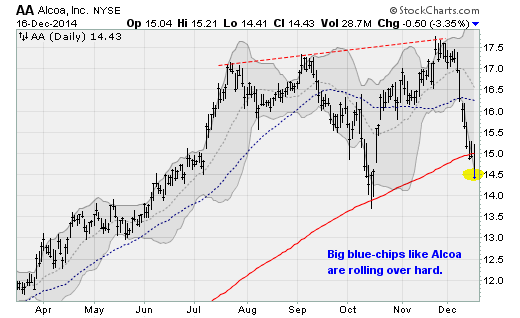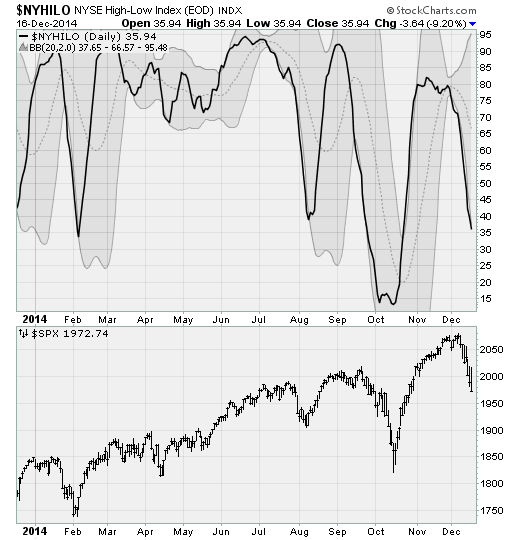Stocks feel like they're nearing a precipice
Things are quickly going from bad to worse for the stock market, with the Dow Jones Industrial Average losing nearly 112 points on Tuesday, or 0.7 percent. That was a swing of 360 points from its earlier session high, and it closed at its low for the day. The other averages didn't fare any better, as the S&P 500 lost 0.9 percent and the Nasdaq Composite dropped 1.2 percent.
All in all, it was a whiplash-inducing trip for stocks as tensions grow heading into Wednesday's eagerly awaited Federal Reserve policy statement. One gets the feeling that we're on the cusp of a precipice here. If the Fed can say the right thing later today, a nice short-term rebound could follow.
But if the statement, or Chairman Janet Yellen in her post-release press conference, says the wrong thing, the situation could get nasty fast.
That's because we're seeing inter-market contagion come into play. What started back in November as a collapse in energy prices has spread to energy stocks and bonds, to the entire high-yield bond market, to the entire stock market, to investment-grade bonds, to emerging-market stocks and now, to foreign currencies.
Russia has become the focal point, suffering from the economic and budgetary impact of the near 50 percent drop in energy prices over the last six months in addition to financial sanctions from the West. Its currency, the ruble, is down 60 percent against the dollar.
This dynamic is typically seen during market panics, such as the one in late 2008, and it's very dangerous because of how hard it is to stem the tide amid a wave of margin calls, forced selling and creeping fear. This is especially true given Tuesday's breakdown in the very popular yen carry trade, which hedge funds and other institutional traders have been using to fund their stock speculating.
According to the Fed whisperers at The Wall Street Journal, there is a "strong possibility" the central bank will drop the "considerable time" phrase from its policy statement today -- signaling that short-term interest rates hikes are about six months away, which would be the first rate increase since 2006.
The reasoning includes the fact that this meeting features a post-statement press conference, giving Fed Chairman Yellen an opportunity to explain the move. If the Fed waits, the next press conference wouldn't be until March. In the context of November's impressive job gains, and the relative strength of the U.S. economy, policymakers could be worried that a delay now would put them behind the curve.
The chatter is that they could shift to a wording emphasizing patience when it comes to the timing and pace of rate hikes -- giving them a flexibility the Fed seems to be craving in this uncertain and chaotic environment.
Investors, who have grown addicted to the Fed's cheap money promises, are unlikely to view such a move positively even though it's widely expected. A poll by Bloomberg found that that 68 percent of economists now expect the Fed to drop the "considerable time" language. So, expect more market fireworks on Wednesday.
Technically, the market looks set for additional weakness based on the relationship between new highs and new lows on the NYSE, which is still well above the lows reached back in October. Until crude oil stabilizes and reverses the contagion dynamic, things are likely to get worse before they get better.


